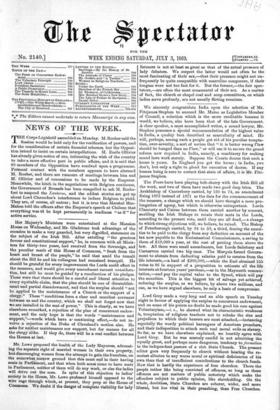The Peers have been playing bob-cherry with the Irish Bill
all the week, and two of them have made two good deep bites. The Archbishop of Canterbury carried, by 130 to 74, an amendment fixing 1872 instead of 1871 as the date for the commencement of the measure, a change which we should have thought a mere pro- longation of agony, but which is otherwise unimportant. Lords Clancarty and Cairns between them carried another by consent, enabling the Irish Bishops to retain their seats in the Lords, according to the present rota, until they are all dead,—a change to which strong objections will, we believe, be raised. The Bishop of Peterborough carried, by 94 to 50, a third, freeing the annui- ties to be paid to the clergy from any deduction on account of the tax now payable to the Ecclesiastical Commissioners, a saving to them of £19,000 a year, at the cost of putting them above the law. All these were small amendments, but Lords Salisbury and Carnarvon carried two big ones. The Marquis forced Govern- ment to abstain from deducting salaries paid to curates from the life interests,—a haul of £200,000,—while the Earl obtained 155 votes to 86 in support of a proposition to estimate all the life interests at fourteen years' purchase,—as in the Maynooth commu- tation,—and pay the capital value to the Synod, which will pay the annuities. This is the biggest bit of salvage yet achieved, reducing the surplus, as we believe, by above two millions, and can, as we have argued elsewhere, be only a basis of compromise.






























